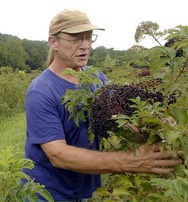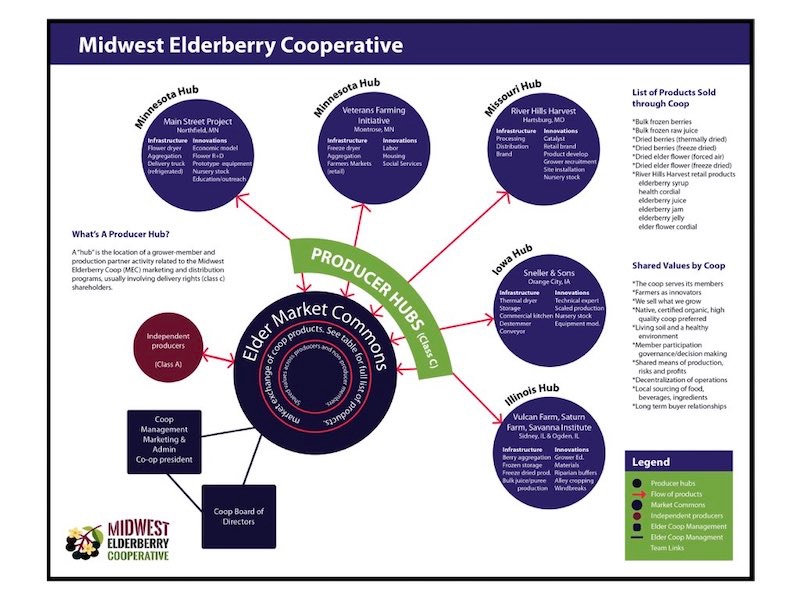
At the 2019 Comprehensive Elderberry Workshop hosted annually by Terry Durham’s River Hills Elderberry Producers and the University of Missouri Extension, Chris Patton announced an MEC goal of 2,250 (twenty-two fifty) profitable, producing acres of elderberry by 2025 harvest. Those acres will be made up of both small grower members selling directly to their customers as well as by commercial scale members who have equity in the coop through distribution rights ownership. (See Membership.)
Projecting a yield average of 4,000 lb./acre for commercial cultivars of S. canadensis, this goal should provide 10,000,000 lb. of collective inventory that includes berries sold directly by growers as well as those marketed through the cooperative’s regional and national efforts as bulk frozen berries and various ingredients. Large scale demand strongly favors and/or must have berries with certified organic papers.
Mr. Patton guesstimates that this size of operation should attain the critical mass of organizational material infrastructure and personnel to provide a foundation for decades of future growth. A vibrant MEC is the best way to keep elderberry harvest and products - both ingredient and retail - “Farmer Grown, Farmer Owned”. While MEC is an open berry cooperative, elder flowers present good revenue opportunities and are in high demand. The flowers are an elderberry crop management by-product requiring quick and local handling and processing: fresh, dried or frozen. They are not directly referred to in most of the following outline. [Print a pdf of this page.]

[Click on the image above to enlarge it.]
7 Point Roadmap to Success
- Grower Recruitment & Education
Since 1997 original commercial grower Terry Durham, with the support of various University of Missouri faculty and researchers, has led the way in this effort. We have an increasing number of persons, farmers who want to grow and are spreading the word, helping to organize informational meetings, educating the public, etc. MEC encourages and supports these independent efforts to expand elderberry acreage.
Elderberry is the #1 berry crop in Missouri, which has increased active interest in elderberry horticulture and potential health benefits from other universities and state departments of agriculture. Ou rAmerican Sambucus canadensis berries present a number of research challenges leading to a variety of grant applications.
Education for the Future: MEC will institute an ongoing education program in successful cooperative operations and leadership for its members, and especially its hub committees and overall directors relying on help from the Association of Cooperative Educators, the Ralph K. Morris Foundation and others. - Equipment & Field/Crop Management Tools
MEC encourages growers to help each other through informal arrangements sharing their individually owned equipment and/or labor resources. These small, decentralized grower clusters are organized and operated freely by the farmers without central supervision.
Equipment Innovation: Terry Durham sells a good mechanical destemmer that makes commercial production feasible. The University of Missouri Extension has a grant to address some of these challenges, and other growers have developed new or adapted existing equipment to harvest, destem, pack the crop, and manage the fields. - Quality Standards & Control
River Hills Harvest (& MEC) Berry Production Documents, found at the bottom of the Membership page, outline how to harvest, process and pack elderberries for commercial production, including purchase by River Hills (Harvest) Elderberry Producers, LLC. MEC will maintain regional quality control through grower education and spot checking of harvests.
At this time we expect to see three classifications: 1) Meets quality in following guidelines with 99% ripe berries, few bits of cyme and within 14 months of harvest. 2) Marketable but below ideal standards and/or over 14 months but under 26 months of harvest. 3) Special Situation: fresh or frozen on the cyme, excessive unripe berries and or bits of stem, older than 26 months, etc. - Grower Direct, Local Marketing
MEC plans to provide a voluntary member profile section on its website where members can share how and why they use elderberry on their farms. This is a way for consumers to learn who their local grower is. Also, if they have products to sell, the MEC page can link over to their sales page. This service will likely require a small annual fee. - Aggregation, Storage & Distribution
MEC is developing regional hubs with significant presence of permanent infrastructure where there are higher volumes of native elderberry crop production. Taking a flexible approach to capital investment suitable for each hub’s members, MEC partners with growers in acquiring and maintaining larger scale operations, storage, distribution and ingredient processing facilities.
Some established farmers already have storage and transport solutions / relationships that they can use for elderberries and may share with other elderberry growers. In parallel MEC will seek and partner in relationships with local to regional solutions with frozen storage and distribution companies. For example, they could provide reefer trailers for 2-4 weeks during harvest and then take the full trucks to a cold storage facility. This kind of arrangement is especially likely for larger growers who sell most of their harvest to MEC. MEC assists in the marketing of a grower’s surplus bulk frozen berry inventory. - Ingredient Development & Processing
MEC has an established relationship with Agricultural Utilization Research Institute (AURI) in Minnesota and works with a number of brewers, and smaller high quality food and beverage makers across the country. MEC is building new partnerships with national brands to supply elderberry ingredients that can provide flavor alternatives to popular consumer products.
MEC markets and sells the aggregated flower and berry harvest and/or the ingredients to wholesale and retail buyers. Commercial growers with Class C shares must annually provide one pound/share of their harvest and participate in MEC’s profits and losses proportionate to their equity participation in the coop (their % of all Class C shareholders). - Finance: $10 million for 10 million lb. annually
MEC maintains and established relationship and credit line with CoBank and encourages growers to research and apply for the financial help available in their state including the USDA/SARE grants. MEC can support this at a high level but lack the staff to do more than that. Most of our members readily share their experience with other growers as part of the coop concept of helping each other to succeed.
This will take some time and involve a number of professionals to help make all of the above sustainable and achieved more quickly. For centuries elderberry has been the berry of the people, and MEC’s goal is to keep this specialty crop and its products “Farmer Owned, Farmer Grown” as much as possible. Our goal is for growers, workers and their communities to profit fairly, and to set the quality and ethical standards in all aspects of elderberry from soil health and environmental sustainability to quality standards benefiting public health - for all consumers of our fruits.
The berries are with us! The flowers shine upon us!
And the leaves shall come before them. Feel the bark…